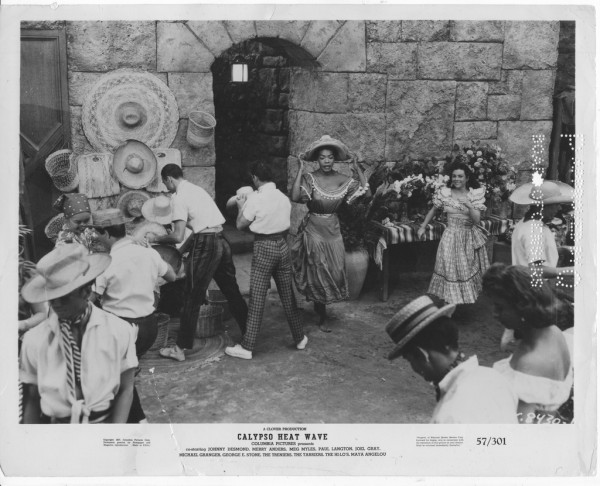Maya Angelou, the world-renowned author, poet and activist, died today at the age of 86. She was best known for her landmark 1969 memoir I Know Why the Caged Bird Sings, which described in brilliant lyrical fashion her upbringing in the Jim Crow South. Angelou would go on to write six more books about her life, along with dozens of poems and essays. Her vivid prose centered on themes of the African-American family, black women, poverty, and racial discrimination. A perhaps lesser-known chapter in Maya Angelou’s illustrious career is her musical endeavors, which included a brief but notable foray into calypso. Even lesser known are her own Caribbean roots.
While a teenager in San Francisco, Angelou, then known by her birth name, Marguerite Johnson, received a scholarship to study dance and drama at San Francisco’s Labor School. She later dropped out of the school and became the city’s first African-American female cable car conductor. Her love for music and dance, however, persisted and she went on to form a dance team with Alvin Ailey (of later Alvin Ailey American Dance Theater fame), performing at local nightclubs throughout the city.
Angelou moved to New York for one year, studying with the famed Trinidadian dancer Pearl Primus, whose influence led her to begin working as a calypso singer and dancer on her return to San Francisco. Interestingly, it was during this time period that Johnson changed her professional name to “Maya Angelou” in an attempt to better capture the feel of her exotic calypso performances. Her talents earned Angelou a role as a featured dancer in the operaPorgy & Bess, with whom she toured throughout Europe during 1954 and 1955. In 1957, at the height of the Harry Belafonte-inspired calypso craze in America, she recorded her first and only album, Miss Calypso. She composed five of the album’s 14 tracks and is the lead singer on the entire album. Sample that album’s Latin-flavored “Neighbour Neighbour” here.
The LP even inspired Angelou’s first feature film, Calypso Heat Wave, in which she acted and sang. Watch the trailer and a recent clip from OWN TV’s Super Soul Sundays in which Angelou revisits this era of her career with Oprah below:
While a teenager in San Francisco, Angelou, then known by her birth name, Marguerite Johnson, received a scholarship to study dance and drama at San Francisco’s Labor School. She later dropped out of the school and became the city’s first African-American female cable car conductor. Her love for music and dance, however, persisted and she went on to form a dance team with Alvin Ailey (of later Alvin Ailey American Dance Theater fame), performing at local nightclubs throughout the city.
Angelou moved to New York for one year, studying with the famed Trinidadian dancer Pearl Primus, whose influence led her to begin working as a calypso singer and dancer on her return to San Francisco. Interestingly, it was during this time period that Johnson changed her professional name to “Maya Angelou” in an attempt to better capture the feel of her exotic calypso performances. Her talents earned Angelou a role as a featured dancer in the operaPorgy & Bess, with whom she toured throughout Europe during 1954 and 1955. In 1957, at the height of the Harry Belafonte-inspired calypso craze in America, she recorded her first and only album, Miss Calypso. She composed five of the album’s 14 tracks and is the lead singer on the entire album. Sample that album’s Latin-flavored “Neighbour Neighbour” here.
The LP even inspired Angelou’s first feature film, Calypso Heat Wave, in which she acted and sang. Watch the trailer and a recent clip from OWN TV’s Super Soul Sundays in which Angelou revisits this era of her career with Oprah below:
Calypso Heat Wave (1957) 2 minute trailer
Paul Langton, Merry Anders, Johnny Desmond, Maya Angelou
Tarriers, Alan Arkin, the Hi-Los, Johnny Desmond, Treniers
A jukebox mobster forces his way into a record company. This angers the
label's biggest star, who doesn't want to change his style. The mobster
makes him disappear and when he does, so does the record company's profits
Paul Langton, Merry Anders, Johnny Desmond, Maya Angelou
Tarriers, Alan Arkin, the Hi-Los, Johnny Desmond, Treniers
A jukebox mobster forces his way into a record company. This angers the
label's biggest star, who doesn't want to change his style. The mobster
makes him disappear and when he does, so does the record company's profits
Performance at 02:07




Comment